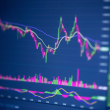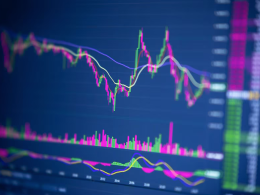Risks Remain High, But May Be Receding
November 7, 2011
by Bob Doll, Chief Equity Strategist, Blackrock
 Volatility Rises Over Greek Surprise
Volatility Rises Over Greek Surprise
Market action last week was dominated by the early in the week announcement from Greek Prime Minister George Papandreou that he would call for a referendum to allow Greek citizens to vote on whether or not the country would accept the previously announced bailout package in exchange for additional austerity measures. This surprise announcement called into question the stability of the eurozone, renewed risks of a chaotic default of Greek debt and caused risk assets (including stocks) to sink sharply. After it became clear that this decision was politically untenable, the probability of such a referendum faded and markets managed to stage a recovery. For the week as a whole, however, stocks were down, with the Dow Jones Industrial Average falling 2.0% to 11,983, the S&P 500 Index declining 2.5% to 1,253 and the Nasdaq Composite dropping 1.9% to 2,686.
In related European policy news, the European Central Bank (ECB) announced last week that it would lower rates from 1.50% to 1.25%. While we recognize that this is a positive step in terms of promoting a more growth-friendly environment, it only partially unwinds the two ill-timed rate hikes imposed by the ECB earlier in the year.
More Moves From the Fed on the Horizon?
The US Federal Reserve met last week and, as part of its decision to keep rates on hold, also announced that it had lowered its economic growth forecast for the country for the next couple of years. While some viewed this downgrade as a surprise, our view is that the Fed was merely catching up with consensus forecasts that had previously taken a dimmer view of the US economy.
Given the Fed's comments, it appears the central bank may be paving the way for an additional round of quantitative easing (i.e., a QE3 program). The Fed has been extremely active in recent years and while the central bank's programs may have prevented a more serious economic disaster, it has failed to deliver the sort of decent economic growth and sharply decreasing unemployment that is typical during the early stages of economic recoveries. To a large extent, this is due to the fact that consumers are still in a deleveraging stage and overall confidence levels remain depressed, which is preventing businesses from hiring.
In any case, we do not think the Fed is quite ready yet to enact QE3, but should we see some sort of combination of further chaos in Europe, inflation levels receding further and economic growth deteriorating, the likelihood would grow. On the economic front, last week saw the release of the October payrolls report. Gains were slightly weaker than expected (up 80,000), but the data also showed that gains in August and September were revised up sharply and that unemployment fell very slightly, from 9.1% to 9.0%.
Market Risks Appear to Be Fading
Notwithstanding last week's decline, markets have accelerated sharply since early October, and it is worth taking a step back to consider what has changed over the past month. Several weeks ago, investors were facing the dual threats of the inability of European policymakers to solve the debt crisis and what seemed to be a growing likelihood of a double-dip recession in the United States. Given that backdrop, equity risk premiums had moved sharply higher. Today, while the environment can hardly be called great, these risks seem less severe than they previously were, which has allowed the risk premiums to recede somewhat.
In Europe, the odds are growing that policymakers will be able to contain the debt crisis and engineer some sort of stable and organized default of Greek debt. Additionally, the ECB has transitioned to an easing bias, which should provide at least some help for the overall economy. In the United States, risks of a renewed recession have been fading and while growth levels are certainly not robust, the economy does appear to be poised to continue to deliver modestly positive levels of growth. The debt crisis and ongoing economic uncertainty are likely to remain headwinds for stocks for some time, but it does appear to us that markets have moved past the period of greatest risk.
About Bob Doll
Bob Doll is Chief Equity Strategist for Fundamental Equities at BlackRock® a premier provider of global investment management, risk management and advisory services. Mr. Doll is also Lead Portfolio Manager of BlackRock's Large Cap Series Funds. Prior to joining the firm, Mr. Doll was President and Chief Investment Officer at Merrill Lynch Investment Managers.
Copyright © Blackrock
Sources: BlackRock, Bank Credit Analyst. This material is not intended to be relied upon as a forecast, research or investment advice, and is not a recommendation, offer or solicitation to buy or sell any securities or to adopt any investment strategy. The opinions expressed are as of November 7, 2011, and may change as subsequent conditions vary. The information and opinions contained in this material are derived from proprietary and nonproprietary sources deemed by BlackRock to be reliable, are not necessarily all-inclusive and are not guaranteed as to accuracy. Past performance is no guarantee of future results. There is no guarantee that any forecasts made will come to pass. Reliance upon information in this material is at the sole discretion of the reader. Investment involves risks. International investing involves additional risks, including risks related to foreign currency, limited liquidity, less government regulation and the possibility of substantial volatility due to adverse political, economic or other developments. The two main risks related to fixed income investing are interest rate risk and credit risk. Typically, when interest rates rise, there is a corresponding decline in the market value of bonds. Credit risk refers to the possibility that the issuer of the bond will not be able to make principal and interest payments. Index performance is shown for illustrative purposes only. You cannot invest directly in an index.
BlackRock is a registered trademark of BlackRock, Inc. All other trademarks are the property of their respective owners.












